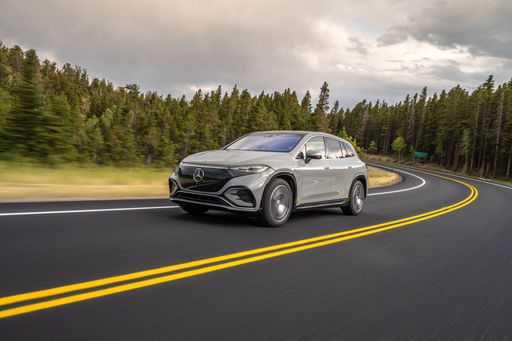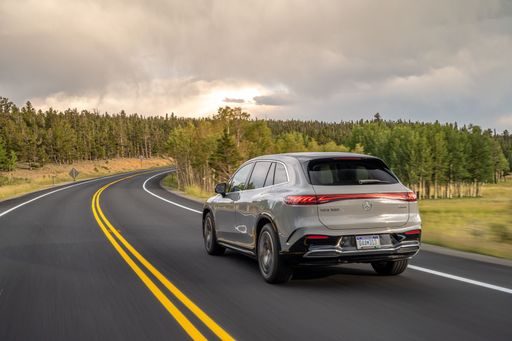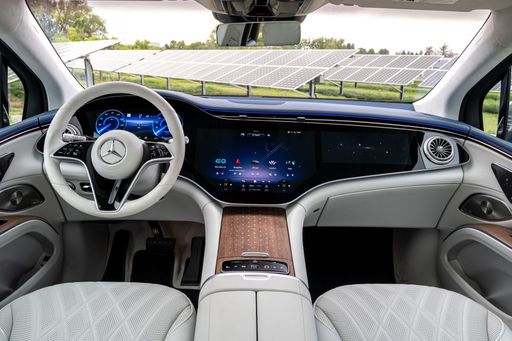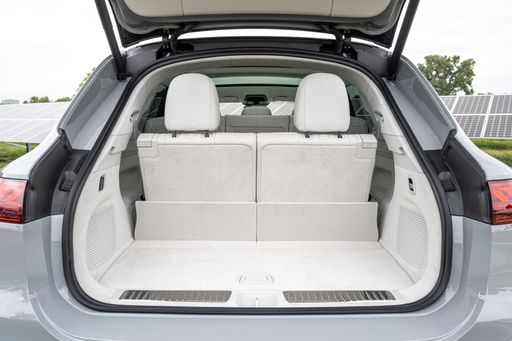Mercedes EQS SUV vs Hyundai IONIQ 9 – Differences & prices compared
Compare performance, boot space, consumption and price in one view.
Find out now: which car is the better choice for you – Mercedes EQS SUV or Hyundai IONIQ 9?
The Mercedes EQS SUV (SUV) comes with a Electric engine and Automatic transmission. In comparison, the Hyundai IONIQ 9 (SUV) features a Electric engine with Automatic transmission.
When it comes to boot capacity, the Mercedes EQS SUV offers 645 L, while the Hyundai IONIQ 9 provides 338 L – depending on how much space you need. If you’re looking for more power, decide whether the 658 HP of the Mercedes EQS SUV or the 428 HP of the Hyundai IONIQ 9 suits your needs better.
In terms of consumption, the values are 19.60 kWh per 100 km for the Mercedes EQS SUV, and 19.90 kWh for the Hyundai IONIQ 9.
Price-wise, the Mercedes EQS SUV starts at 95000 £, while the Hyundai IONIQ 9 is available from 58700 £. Compare all the details and find out which model fits your lifestyle best!
Mercedes EQS SUV
The Mercedes-Benz EQS SUV redefines luxury in the electric vehicle segment with its elegant design and cutting-edge technology. Its spacious interior provides exceptional comfort, featuring high-quality materials and innovative ambient lighting to create a serene driving environment. This SUV impressively combines sustainability with performance, offering a smooth and quiet ride without compromising on power.
details @ group-media.mercedes-benz.com
@ group-media.mercedes-benz.com
 @ group-media.mercedes-benz.com
@ group-media.mercedes-benz.com
 @ group-media.mercedes-benz.com
@ group-media.mercedes-benz.com
 @ group-media.mercedes-benz.com
@ group-media.mercedes-benz.com
Hyundai IONIQ 9
The Hyundai IONIQ 9 is a bold step forward in the automotive world, combining cutting-edge electric technology with a sleek and modern design. This model stands out with its spacious interior and advanced features, ensuring both comfort and convenience for drivers and passengers alike. As Hyundai pushes the envelope in eco-friendly innovation, the IONIQ 9 represents the future of sustainable driving with its impressive range and performance capabilities.
details

|
|
|
|
|
Costs and Consumption |
|
|---|---|
|
Price
95000 - 212100 £
|
Price
58700 - 74400 £
|
|
Consumption L/100km
-
|
Consumption L/100km
-
|
|
Consumption kWh/100km
19.6 - 21.9 kWh
|
Consumption kWh/100km
19.9 - 20.6 kWh
|
|
Electric Range
615 - 695 km
|
Electric Range
600 - 620 km
|
|
Battery Capacity
108.4 - 118 kWh
|
Battery Capacity
110 kWh
|
|
co2
0 g/km
|
co2
0 g/km
|
|
Fuel tank capacity
-
|
Fuel tank capacity
-
|
Dimensions and Body |
|
|---|---|
|
Body Type
SUV
|
Body Type
SUV
|
|
Seats
4 - 5
|
Seats
7
|
|
Doors
5
|
Doors
5
|
|
Curb weight
2695 - 3075 kg
|
Curb weight
2594 - 2689 kg
|
|
Trunk capacity
440 - 645 L
|
Trunk capacity
338 L
|
|
Length
5125 mm
|
Length
5060 mm
|
|
Width
1959 - 2034 mm
|
Width
1980 mm
|
|
Height
1718 - 1721 mm
|
Height
1790 mm
|
|
Payload
425 - 570 kg
|
Payload
586 - 643 kg
|
Engine and Performance |
|
|---|---|
|
Engine Type
Electric
|
Engine Type
Electric
|
|
Transmission
Automatic
|
Transmission
Automatic
|
|
Transmission Detail
-
|
Transmission Detail
Reduction Gearbox
|
|
Drive Type
All-Wheel Drive, Rear-Wheel Drive
|
Drive Type
Rear-Wheel Drive, All-Wheel Drive
|
|
Power HP
360 - 658 HP
|
Power HP
218 - 428 HP
|
|
Acceleration 0-100km/h
4.4 - 6.8 s
|
Acceleration 0-100km/h
5.2 - 9.4 s
|
|
Max Speed
210 km/h
|
Max Speed
190 - 200 km/h
|
|
Torque
568 - 950 Nm
|
Torque
350 - 700 Nm
|
|
Number of Cylinders
-
|
Number of Cylinders
-
|
|
Power kW
265 - 484 kW
|
Power kW
160 - 315 kW
|
|
Engine capacity
-
|
Engine capacity
-
|
General |
|
|---|---|
|
Model Year
2024
|
Model Year
2025
|
|
CO2 Efficiency Class
A
|
CO2 Efficiency Class
A
|
|
Brand
Mercedes-Benz
|
Brand
Hyundai
|
Mercedes EQS SUV
Introduction to the Mercedes-Benz EQS SUV
The Mercedes-Benz EQS SUV stands as a testament to the capabilities of electric technology combined with luxury. Designed as an electric counterpart to its combustion-engine siblings, the EQS SUV offers opulent comfort, cutting-edge technology, and impressive performance metrics, all wrapped in a sustainable package.
Powertrain and Performance
At the heart of the EQS SUV lies a fully electric powertrain that varies across different models, offering power outputs ranging from 360 to 658 PS. These performance figures translate to an acceleration from 0 to 100 km/h in just 4.4 to 6.8 seconds, depending on the variant. The all-wheel drive configurations, with intricate dynamics and traction control, allow the EQS SUV to maintain optimal performance even in challenging conditions.
Battery and Range
The Mercedes-Benz EQS SUV offers a pioneering battery capacity of between 108.4 and 118 kWh. This substantial capacity contributes to the robust electric range of 599 to 709 km on a single charge, making long-distance travel feasible without frequent recharging stops. The efficiency of 19.1 to 22.5 kWh/100 km further demonstrates the SUV's capacity to maximise mileage while minimising energy consumption.
Interior and Comfort
Luxury is at the forefront of the EQS SUV's interior design. The cabin accommodates four to five passengers in an environment enriched with premium materials and state-of-the-art technology. The optional First Class 4MATIC line introduces seating and trim upgrades, ensuring a superior travel experience.
Technology and Innovation
The EQS SUV showcases Mercedes-Benz's commitment to innovation through features like the MBUX Hyperscreen, an expansive, high-resolution display that combines the instrument cluster, infotainment, and passenger display into a seamless unit. Advanced driver assistance systems further enhance safety and convenience, signalling Mercedes' ongoing pursuit of autonomous capabilities.
Exterior Design and Dimensions
Combining a sleek aesthetic with practical dimensions, the EQS SUV measures 5125 mm in length, 1959 to 2034 mm in width, and 1718 to 1721 mm in height. This design not only contributes to excellent aerodynamics but also maximises interior space, leading to a generous boot capacity of 440 to 645 litres.
Environmental Impact
With a CO2 efficiency class of A and zero direct emissions (0 g/km CO2), the EQS SUV embodies Mercedes-Benz’s commitment to a sustainable future. This electric SUV represents a key step in the company’s vision of electrification and reducing the automotive industry’s carbon footprint.
Conclusion
The Mercedes-Benz EQS SUV merges luxury with the practicality required for modern living, all while championing sustainability. Its wide range of performance options, expansive range, and innovative technologies make it a strong contender in the electric vehicle landscape, setting new standards for premium electric SUVs.
Hyundai IONIQ 9
The All-New Hyundai IONIQ 9: Redefining Electric Mobility
As the automotive world advances towards a sustainable future, the 2025 Hyundai IONIQ 9 emerges as a powerful testament to the fusion of luxury, innovation, and eco-conscious engineering. Designed as a premium electric SUV, the IONIQ 9 offers a blend of advanced electric performance and cutting-edge technology.
Unmatched Performance and Efficiency
The Hyundai IONIQ 9 arrives in multiple variants, catering to diverse driving preferences with its array of power outputs and configurations. At the core, you'll find either a rear-wheel-drive model or an all-wheel-drive setup. The power output ranges from a robust 218 HP for daily efficiency to an exhilarating 428 HP in the high-performance version.
The efficiency of the IONIQ 9 is equally remarkable, boasting an electric consumption between 19.9 and 20.6 kWh per 100 km. This ensures a substantial range of 600 to 620 km on a single charge, powered by a 110 kWh battery capacity. With a top speed ranging between 190 and 200 km/h and a dynamic acceleration capability that propels the SUV from 0-100 km/h in just 5.2 to 9.4 seconds, the IONIQ 9 is engineered for thrill and precision.
Innovative Technological Features
The Hyundai IONIQ 9 is not just about remarkable performance; it is a technological marvel designed for a sophisticated driving experience. Equipped with an automatic transmission system and a reduction gearbox, the IONIQ 9 enhances driver engagement while maintaining seamless power delivery. The zero-emission SUV carries a CO2 efficiency class of A, symbolizing its commitment to eco-friendly transportation.
Advanced safety and infotainment systems underscore the IONIQ 9’s tech-forward nature. Whether navigating busy city streets or exploring open highways, Hyundai's cutting-edge driver-assistance technologies are ever-present, making each journey secure and enjoyable.
Luxurious Design and Comfort
With dimensions measuring 5060 mm in length, 1980 mm in width, and 1790 mm in height, the IONIQ 9's substantial presence on the road is undeniable. Its 7-seater arrangement accommodates families and group travelers with ease, supported by intelligently designed interiors that prioritize comfort and functionality.
The trunk capacity of 338 liters ensures ample space for luggage, making the IONIQ 9 an ideal companion for those long family trips. Coupled with a payload capacity of up to 643 kg, versatility is at the heart of its design ethos.
A Commitment to Sustainability
The Hyundai IONIQ 9 exemplifies Hyundai's steadfast dedication to a sustainable future. With a curb weight ranging from 2594 to 2689 kg, it is engineered to optimize energy usage while delivering dynamic performance. The zero grams CO2 emission underlines its role as an eco-friendly powerhouse in the electric SUV segment.
As Hyundai continues to innovate and push boundaries, the IONIQ 9 sets a new standard for electric luxury vehicles, offering environmentally conscious drivers a chance to lead the charge in sustainable mobility without compromising on style, comfort, or performance.
Conclusion
The Hyundai IONIQ 9 stands as a beacon of the next generation of electric vehicles. Luxury meets responsibility in this masterfully engineered SUV. With its assortment of technical advancements and a firm commitment to reducing the carbon footprint, the IONIQ 9 not only paves the way for future cars but also transforms how we perceive environmentally responsible driving. As we stride into an era of greener motoring, the IONIQ 9 leads with elegance and purpose, truly a testament to Hyundai's innovation legacy.
Which drive types are available for the Mercedes EQS SUV?
Available as All-Wheel Drive or Rear-Wheel Drive.
The prices and data displayed are estimates based on German list prices and may vary by country. This information is not legally binding.
